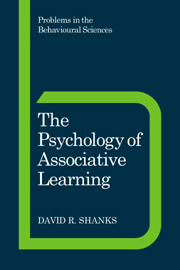5 - Rule induction
Published online by Cambridge University Press: 26 January 2010
Summary
The picture of concept learning that emerges from the previous chapters is of a rather passive process in which instances are encoded in memory as a result of weight adjustments in an adaptive network system. This is passive in the sense that so long as the subject attends to the stimuli, the hypothesised processes operate automatically on the incoming information. But it has commonly been argued that in some circumstances a different, active process can operate whereby a person considers various hypotheses concerning relationships between events, modifies or rejects inadequate hypotheses, and in short tries to induce a rule describing the relationship between stimuli and outcomes. In this chapter we consider the evidence that the account of associative learning discussed in the previous chapters is incomplete and needs to be supplemented by an additional and possibly independent rule-learning mechanism.
Before considering the evidence and nature of this rule-learning process, it is necessary first to consider what exactly we mean by a ‘rule’. This concept has, to put it mildly, been a source of some debate and confusion amongst psychologists and philosophers. On the surface, the definition of a rule seems unproblematic: we simply say that a rule is a principle that specifies definitively whether an object or event is of a particular sort or not. For instance, if an object has four sides of equal length lying in a plane and with right-angles between them, then it is a square. Any object conforming to this principle is a square, and any object that violates the principle is not a square.
- Type
- Chapter
- Information
- The Psychology of Associative Learning , pp. 152 - 180Publisher: Cambridge University PressPrint publication year: 1995
- 2
- Cited by



